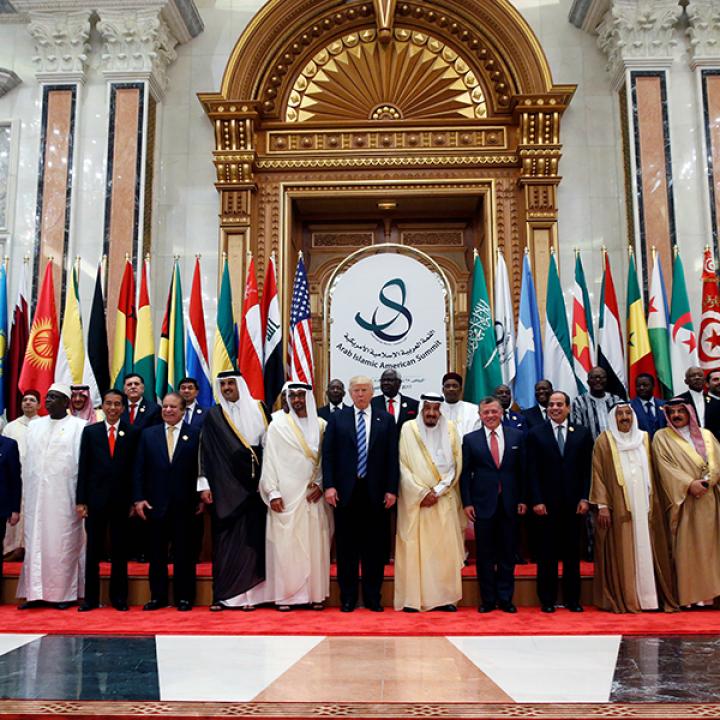
- Policy Analysis
- Articles & Op-Eds
The Shortest Route to Mideast Peace Is Through Saudi Arabia

A peace conference in Jeddah attended by Israelis and Palestinians could be a first step toward serious talks.
The recent flare-up at the Temple Mount, also known Haram Al Sharif, in Jerusalem reminds American foreign policy makers of the sensitivity of the Israeli-Palestinian issue. Israel increased security on the Haram Al Sharif last month after a shooting at the holy site left two Israeli policemen dead, prompting protests in Jordan, among other places in the Middle East, and major Arab newspapers to attack Israel for its security crackdown. This series of events should serve as a wake-up call to the Trump Administration to stop kicking the can down the road.
Due to significant regional shifts over the past few decades, it now appears that the best and shortest route to achieve a two-state solution and a Palestinian state is through Saudi Arabia and no longer through Egypt and Jordan, which Washington relied on for many years. Both countries have lost their places at the helm of the Arab world, as Egypt is plagued by severe economic hardships and internal political divisions while Jordan lacks the regional political clout to sell a peace deal with Israel to the Arab world.
Hence, a new American approach that involves the Saudis directly should be encouraged for several reasons.
First, the kingdom has strong political and financial influence in the region. Direct involvement from the oil-wealthy kingdom and the birthplace of Islam would put the Palestinian Authority (PA) in a position to take the negotiation seriously. Rejecting Saudi instructions would come at a very high cost to the PA in terms of both public and material support. Saudi backing would provide additional religious, financial, and political legitimacy to the PA, which has been reluctant to make important decisions related to the conflict due to its fear of losing legitimacy.
Second, the next generation of Saudi leaders, headlined by Saudi Crown Prince Mohammad bin Salman, has taken a more proactive foreign policy approach and has demonstrated a sense of urgency toward countering Iranian influence and extremism in the region. They realize how the Iranian axis has abused the Palestinian question and used its propaganda to rally support to its cause. The Saudi public is generally sympathetic toward the Palestinian cause, and therefore it could be a perfect time for Crown Prince Mohammad to boost his popularity at home and across the region and simultaneously counter growing Iranian influence if he successfully brokered a deal for the Palestinians.
Third, direct involvement of the Saudis is likely to incentive the current Israeli right-wing government to make more concessions to the Palestinians. For many years, Israel has been seeking to broaden its relations with the Arab world. Unlike Egyptian and Jordanian involvement, sponsorship of the talks by the Saudis will afford Israeli Prime Minister Benjamin Netanyahu the opportunity to sell the deal to his right-wing constituents on the grounds of normalizing relations with the Arab world. A peace conference in Jeddah attended by the Israelis and Palestinians under the auspices of the custodian of the holy mosques could be a first step toward real peace talks. Historically, the Israeli government has made unexpected concessions for normalized relations with Arab states, as demonstrated by former Israeli Prime Minister Menachem Began reneging on his promise not to evacuate settlements in the Sinai Peninsula in exchange for Israel's first peace treaty with an Arab country.
Lastly, in today's Middle East landscape, Iran and radical Islamist groups are more dangerous threats to Saudi Arabia than Israel. This reality has led to a realization by both Saudi and Israeli officials that their primary national security concerns intersect and that the two sides share certain strategic goals such as containing Iran. By resolving the Israeli-Palestinian conflict, Saudi Arabia and Israel could remove the stumbling block this conflict has become and instead focus on strengthening ties and working collectively to counter threats in the region.
Resolving the Israeli-Palestinian issue has been one of U.S. President Donald Trump's main priorities, as it has been for previous U.S. administrations. Success here would free U.S. diplomatic efforts and power to contain Iran and address Tehran's threats in the region. Direct Saudi involvement could be the missing piece of the Israeli-Palestinian puzzle.
Haisam Hassanein is the 2016-17 Glazer Fellow at The Washington Institute.



